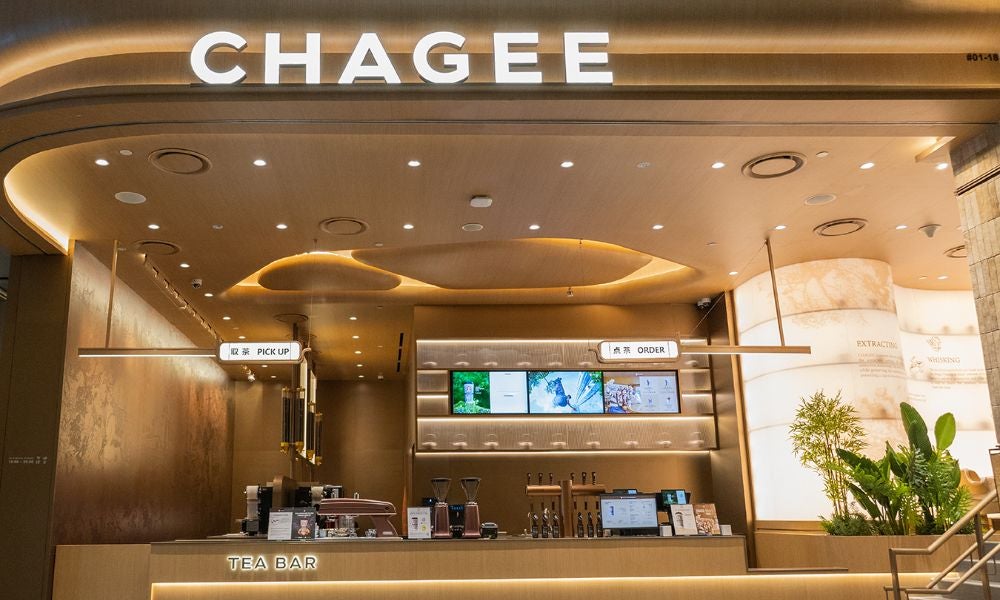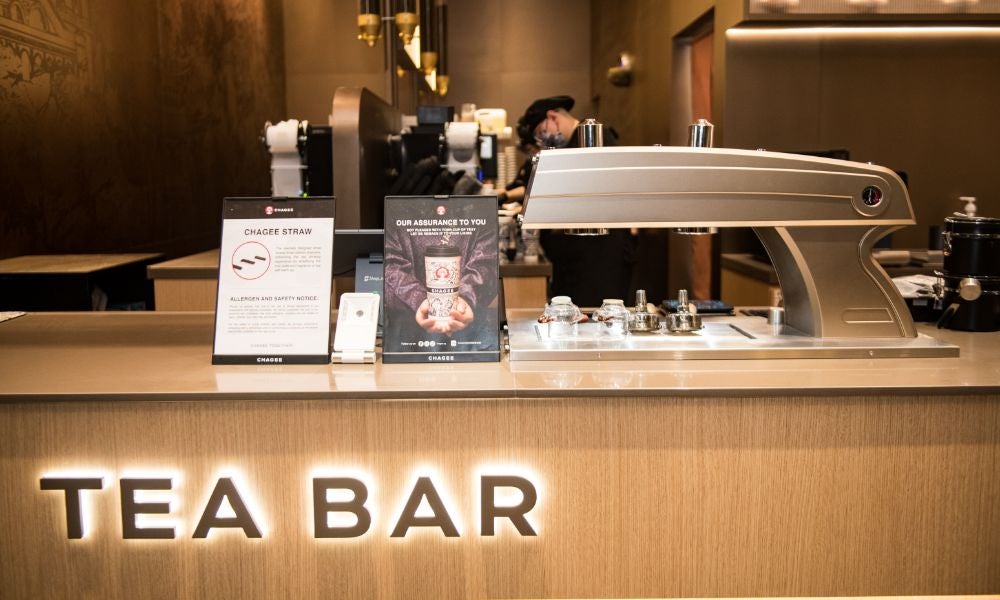Bridging culture through tech and tea: CHAGEE CEO Lawrence Wen
CHAGEE’s CEO Lawrence Wen explains how technology and tradition drive global growth, enhance the customer experience and add value in the competitive tea market
Bridging today’s “grab-and-go” world to the past through tea, as CHAGEE’s brand of modern tea bars seek to do, is a tall order, according to CEO Lawrence Wen – especially in a highly competitive market. But the company’s success, with over 5000 stores globally and growing, suggests its recipe is working.
CHAGEE has several things helping it towards that aim, including its foundation story as a modern tea brand founded in Yunnan Province, China, the hometown of tea. It also received the world record in 2017 for the largest organic oolong tea farm. Interestingly, Mr Wen also credited a commitment to investing in technology as helping CHAGEE bridge to the past, enabling it to offer an “elevated tea-drinking experience”.
Technology has been integral to CHAGEE’s growth, driving its strategic initiatives and enhancing product quality and efficiency. It’s all in support of the company’s commitment to “refining every aspect of the customer journey, from the moment an order is placed to the final delivery of the drink”, said Mr Wen, a UNSW Sydney alumnus who most recently led online food delivery platform foodpanda before joining CHAGEE in June.
“Given my background in platform and technology, I prioritise creating an industry-leading digital experience for our customers,” he said. “Our focus is on developing the best user interface/user experience, ensuring that the interaction with our brand is seamless, intuitive and engaging.”
This focus on continuously improving its technological infrastructure and capabilities to provide an enhanced cultural experience is also crucial to CHAGEE’s success in the competitive Southeast Asian tea market and its global aspirations. While its focus on modern milk tea drinks, using raw-leaf tea and fresh milk, is unique, CHAGEE competes within the established US$2.6 billion global bubble tea market, a crowded field projected to grow to nearly $4.8 billion by 2032.

“We maintain a vigilant watch over the competitive environment, keeping an eye on what our competition is excelling at, be it in terms of supply chain processes, consumer preferences, design innovations, or emerging threats and substitutes,” Mr Wen, who earned a double degree in Commerce and Law from UNSW Sydney in 2009, said. “By doing so, we ensure that our brand remains agile, continuously adapting and evolving to meet the needs of each specific market.”
In describing CHAGEE’s approach to operating in a highly competitive market, he cited a well-known Chinese proverb, translating to: “Know the enemy, know yourself, and in every battle you will be victorious.”
Tapping into an ancient tradition
Since opening its first store in Yunnan in November 2017, CHAGEE has grown its presence in China to include all major provinces and cities and has expanded into Malaysia, Thailand, and Singapore. It ultimately plans to reach 100 countries and serve 15 billion cups of tea annually.
The company's central headquarters is in Shanghai, and it directly manages flagships and stores that it franchises once it has tested its business model and established a presence in a new market. With a 500-acre plantation at the optimal elevation for growing tea plants, it produces certified organic tea through a 12-step process.
A key driver of CHAGEE’s growth and success is its focus on attracting a younger audience accustomed to fast-paced lifestyles that is also demanding more authentic experiences. It’s part of CHAGEE’s goal of “reintroducing traditional tea culture – and the appreciation of it – in a modern context”, according to Wen.
Read more: Tapping into Asian markets: A social media guide for businesses
The appeal to younger demographics stems partly from CHAGEE’s focus on quality ingredients and transparency. For example, in 2023, the company removed artificial flavourings from its tea bases, eliminated creamers from its milk and ensured its products were free of trans fatty acids. It also provides calorie content and other nutritional information about its beverages.
According to Mr Wen, another draw for younger customers is CHAGEE’s new tea bars, which he said combine thoughtful design and educational elements to offer an attractive dine-in café experience, allowing people to “slow down a little, enjoy a good cup of tea and socialise”. He noted that in CHAGEE’s Singapore stores, large murals depicting the history and evolution of tea brewing adorn the walls, “offering a deeper cultural context and education to the humble beverage”.
Leveraging technology to compete
Mr Wen credited technology, though, with enabling CHAGEE to keep up with modern consumers, who value accessibility and convenience.
“Understanding this, CHAGEE successfully leveraged the latest technologies to semi-automate our tea-making processes, with baristas only needing to scan a QR code for the machine to dispense the exact formulation for specific drink orders (e.g., jasmine milk green tea with normal sugar),” Mr. Wen noted. “This, in turn, helped to significantly shorten the waiting time for customers upon ordering. The state-of-the-art ‘Teaspresso’ machines in our stores are also great examples of how we actively embrace innovation to provide consumers with an expanded range of special beverage offerings, such as the popular ‘Teaspresso Latte and Frappé series.”

CHAGEE also has an enhanced app that allows users to track the progress of their orders. It includes an in-app calorie counter to educate customers about how much sugar and calories they’re getting with their drink order.
Technology also plays a significant role in helping CHAGEE address supply chain constraints, which have been a critical concern since the COVID-19 pandemic. CHAGEE also maintains crucial strategic partnerships with various platforms that help it manage demand efficiently while opening up new distribution channels, allowing it to broaden and diversify its consumer base. “Technology, therefore, is not just a tool but a cornerstone of our strategy, enabling us to innovate and expand in a highly competitive market,” Mr Wen said.
‘Change is the only constant’
Another element CHAGEE has introduced to ensure it remains competitive also reflects Mr Wen’s management style, engaging employees in the brand’s success by encouraging them, essentially, to do their own market research by trying competitors’ products. “The company covers these costs to ensure that our team remains well-informed and attuned to the latest trends and competitive dynamics,” Mr Wen explained. “This proactive approach allows us to stay ahead of the curve and seize opportunities for growth and expansion effectively.”
He then turned to his advice for graduates and aspiring leaders, saying they must sift through the often abundant and overwhelming business advice they are likely to receive and “develop and adhere to a set of guiding principles that can be adapted to any environment”. For Mr Wen, the principles that have been instrumental in his journey navigating leadership roles at both CHAGEE and foodpanda begin with embracing change.
Subscribe to BusinessThink for the latest research, analysis and insights from UNSW Business School
“Change is the only constant in any organisation,” he said. “Expect the unexpected and learn to adapt and anticipate change. The better you embrace and forecast it, the more you will thrive.”
He said that aspiring leaders should also focus on hard skills early, refining soft skills later. “Early in your career, concentrate on building hard skills such as modelling, coding and analytical abilities,” he said, noting that such foundational skills are crucial. “As you progress, shift your focus to soft skills – communication, leadership and emotional intelligence,” he added. “Ultimately, businesses are run by people, and your ability to work effectively with others is paramount.”
Mr Wen’s other key principles are being results-driven – “Regardless of your profession, delivering tangible results is key, so strive to add value in everything you do,” he said – and rethinking work-life balance. “Instead of seeing work and life as separate entities, view them as interconnected,” he said. “By integrating work into your daily life in a way that you find fulfilling, you can achieve a healthy, balanced lifestyle that best suits you."
